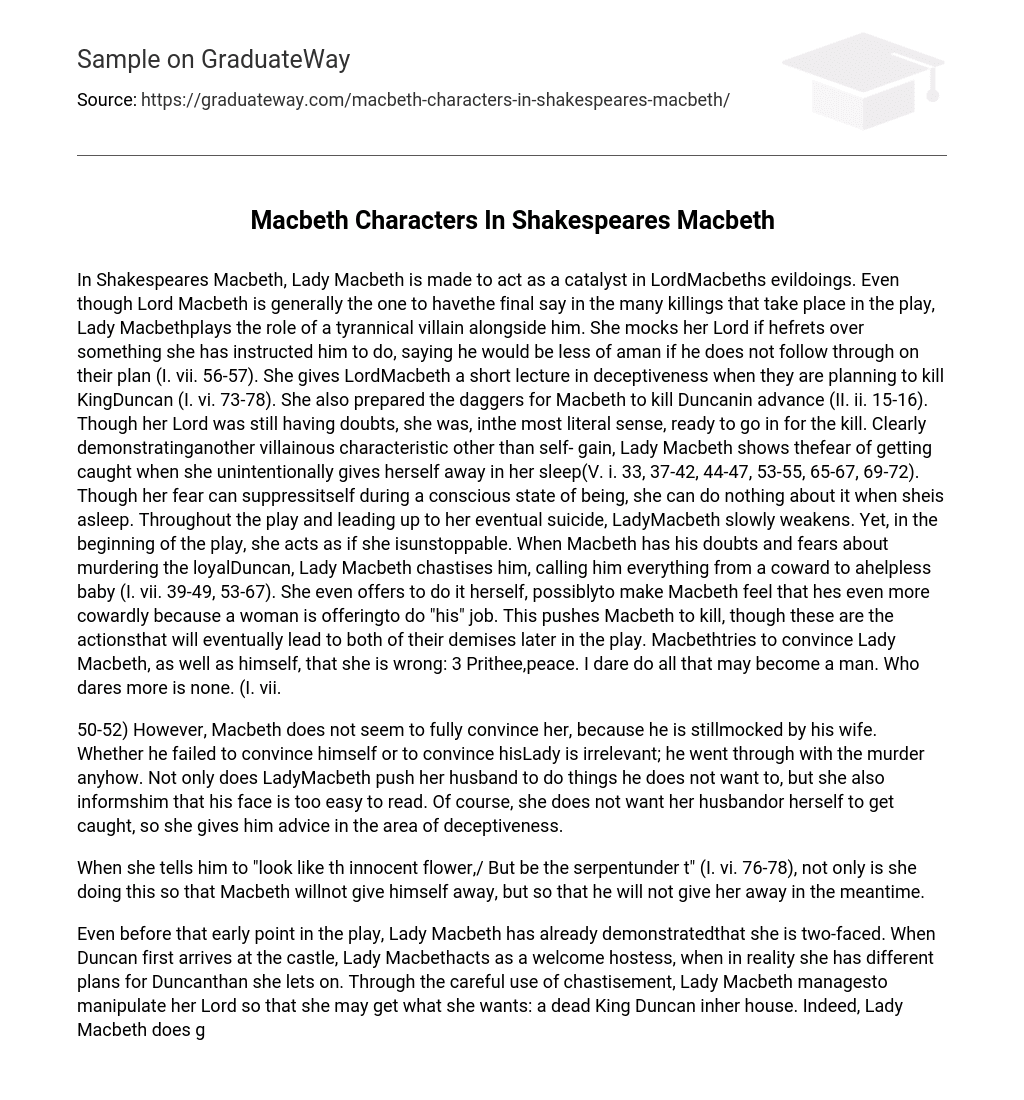In Shakespeares Macbeth, Lady Macbeth is made to act as a catalyst in LordMacbeths evildoings. Even though Lord Macbeth is generally the one to havethe final say in the many killings that take place in the play, Lady Macbethplays the role of a tyrannical villain alongside him. She mocks her Lord if hefrets over something she has instructed him to do, saying he would be less of aman if he does not follow through on their plan (I. vii. 56-57). She gives LordMacbeth a short lecture in deceptiveness when they are planning to kill KingDuncan (I. vi. 73-78). She also prepared the daggers for Macbeth to kill Duncanin advance (II. ii. 15-16). Though her Lord was still having doubts, she was, inthe most literal sense, ready to go in for the kill. Clearly demonstratinganother villainous characteristic other than self- gain, Lady Macbeth shows thefear of getting caught when she unintentionally gives herself away in her sleep(V. i. 33, 37-42, 44-47, 53-55, 65-67, 69-72). Though her fear can suppressitself during a conscious state of being, she can do nothing about it when sheis asleep. Throughout the play and leading up to her eventual suicide, LadyMacbeth slowly weakens. Yet, in the beginning of the play, she acts as if she isunstoppable. When Macbeth has his doubts and fears about murdering the loyalDuncan, Lady Macbeth chastises him, calling him everything from a coward to ahelpless baby (I. vii. 39-49, 53-67). She even offers to do it herself, possiblyto make Macbeth feel that hes even more cowardly because a woman is offeringto do “his” job. This pushes Macbeth to kill, though these are the actionsthat will eventually lead to both of their demises later in the play. Macbethtries to convince Lady Macbeth, as well as himself, that she is wrong: 3 Prithee,peace. I dare do all that may become a man. Who dares more is none. (I. vii.
50-52) However, Macbeth does not seem to fully convince her, because he is stillmocked by his wife. Whether he failed to convince himself or to convince hisLady is irrelevant; he went through with the murder anyhow. Not only does LadyMacbeth push her husband to do things he does not want to, but she also informshim that his face is too easy to read. Of course, she does not want her husbandor herself to get caught, so she gives him advice in the area of deceptiveness.
When she tells him to “look like th innocent flower,/ But be the serpentunder t” (I. vi. 76-78), not only is she doing this so that Macbeth willnot give himself away, but so that he will not give her away in the meantime.
Even before that early point in the play, Lady Macbeth has already demonstratedthat she is two-faced. When Duncan first arrives at the castle, Lady Macbethacts as a welcome hostess, when in reality she has different plans for Duncanthan she lets on. Through the careful use of chastisement, Lady Macbeth managesto manipulate her Lord so that she may get what she wants: a dead King Duncan inher house. Indeed, Lady Macbeth does get what she wants, and ultimately what shedeserves, as the play progresses. Usually, though she has to nudge her husband abit before he takes action, Macbeth is relatively obedient. Lady Macbeth seemsto realize that her husband probably will not go through with the murder ofDuncan until she pushes him to the point of no return, so she prepareseverything in advance. All Macbeth has to do for 4 his part in the murder isactually kill Duncan; Lady Macbeth sets out the daggers and gives the guardsenough alcohol so that they pass out. She was so eager to have Duncan dead thatshe almost killed him herself. “Had he not resembled/ My father as he slept, Ihad done t” (II. ii. 16-17). Yet she still had her husband commit thecrime, whether it was because she was actually scared to do so, or because shewanted him to feel empowered. Either way, Lady Macbeth was definitely ready forDuncan to die. Despite her eagerness earlier in the play, Lady Macbeth seems abit afraid that she might get caught later in the play. When she sleepwalks andtalks in her sleep, she demonstrates a fear that clearly represents the factthat she is scared of being caught. She talks of going to bed and washing herhands with the famous “Out, damned spot, out, I say!” (V. i. 37) phrase.
When she yells about ridding herself of Duncans blood, she is presenting ametaphor: she does not truly want to be rid of Duncans blood itself, butrather the fear and guilt that his murder has forced upon her. The constantnightmares she has and the fear and guilt she must live will become too much;she commits suicide, proving once again that she is a tyrannical villain becauseshe cannot deal with the repercussions of her actions. As a result of heractions and the actions of her husband, Lady Macbeth meets an untimely demise atthe end of the play. Yet most of what happened was due to Lady Macbethsdoings. If she had not pushed Lord Macbeth so hard to do something that he didnot originally want to do, then Duncan would have lived and Lady Macbeth wouldnot have gone through such anguish. She was too eager to kill; she seemed to beonly interested in her own personal gain and possibly her husbands gain,because she couldnt 5 have had one without the other. All in all, LadyMacbeth is the quintessential tyrannical villain who was bent on winning, but inthe end she ultimately lost.





